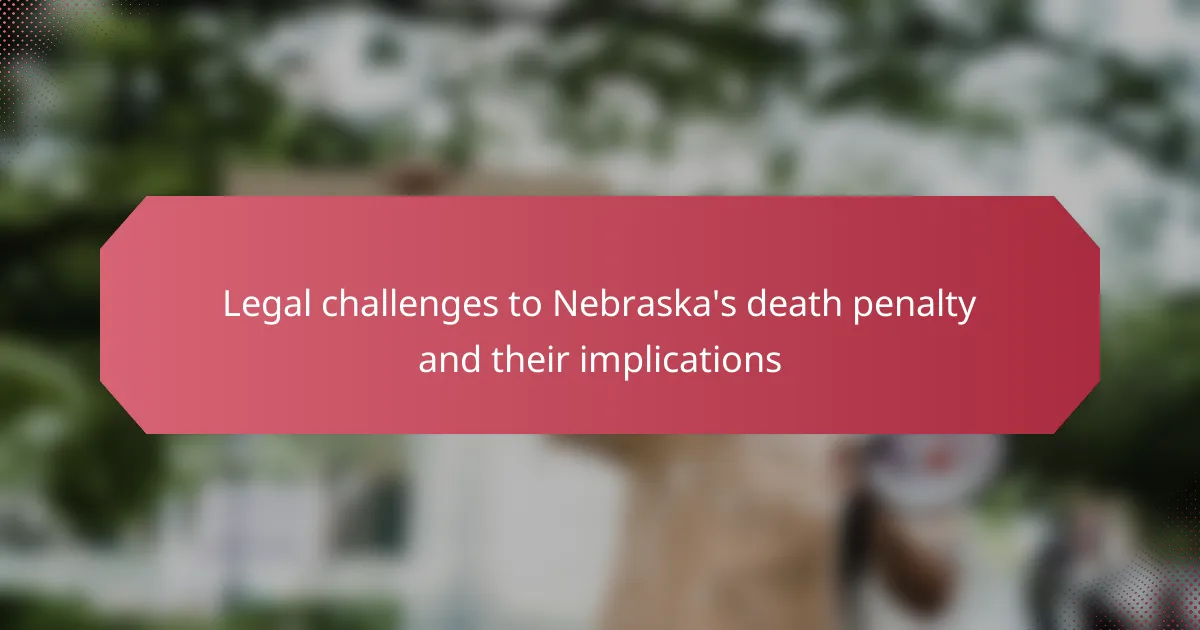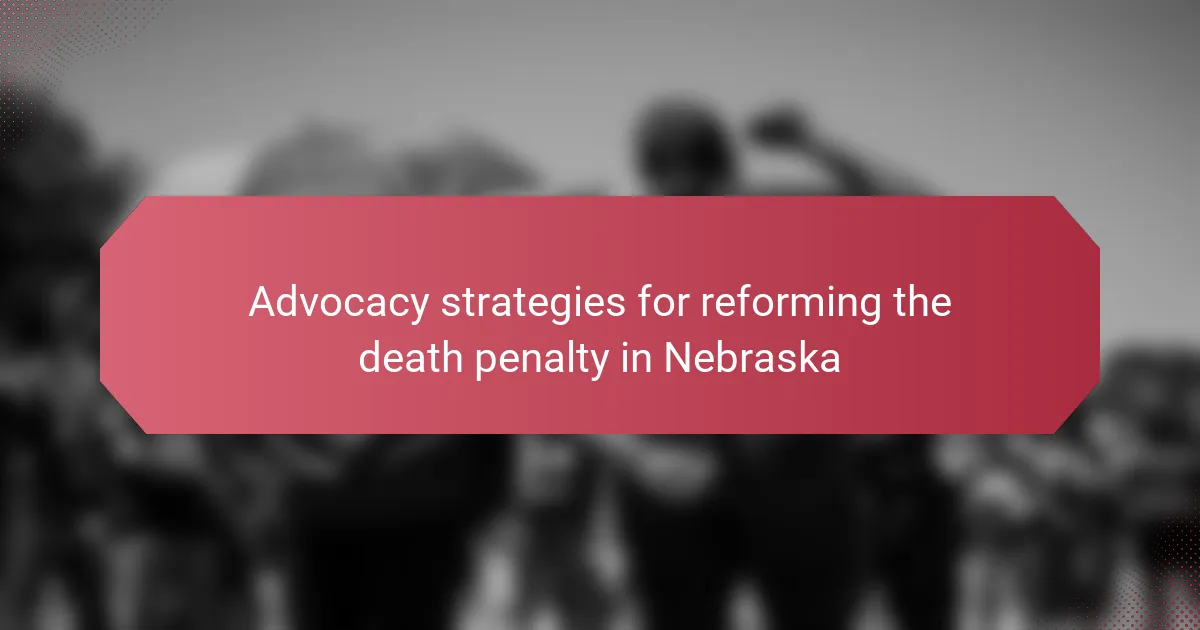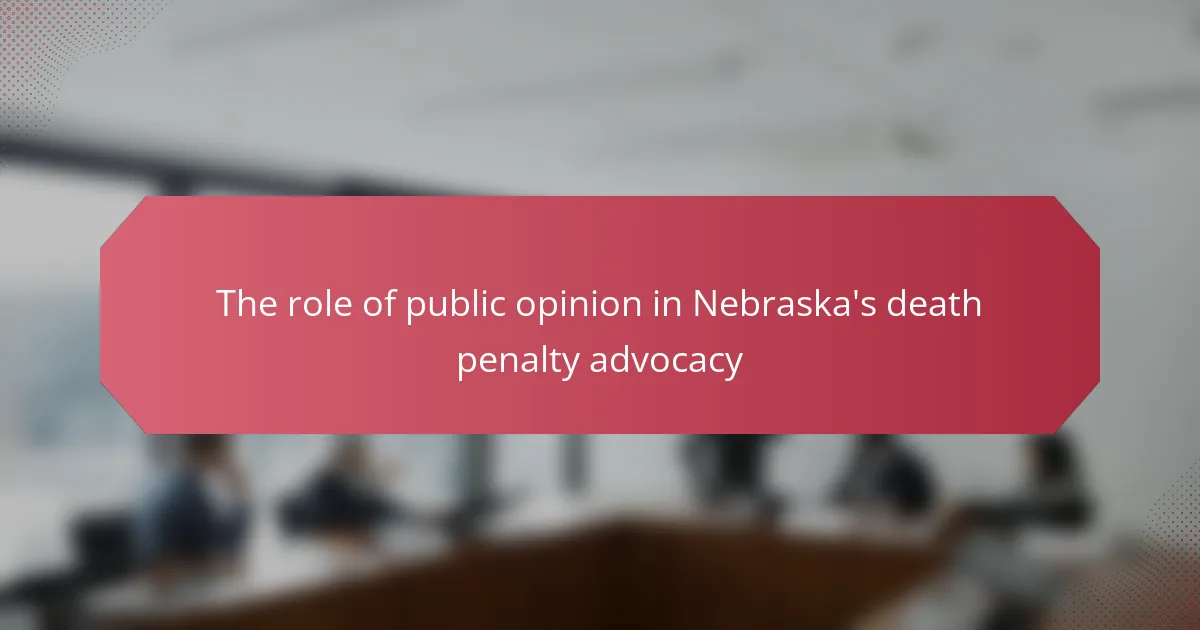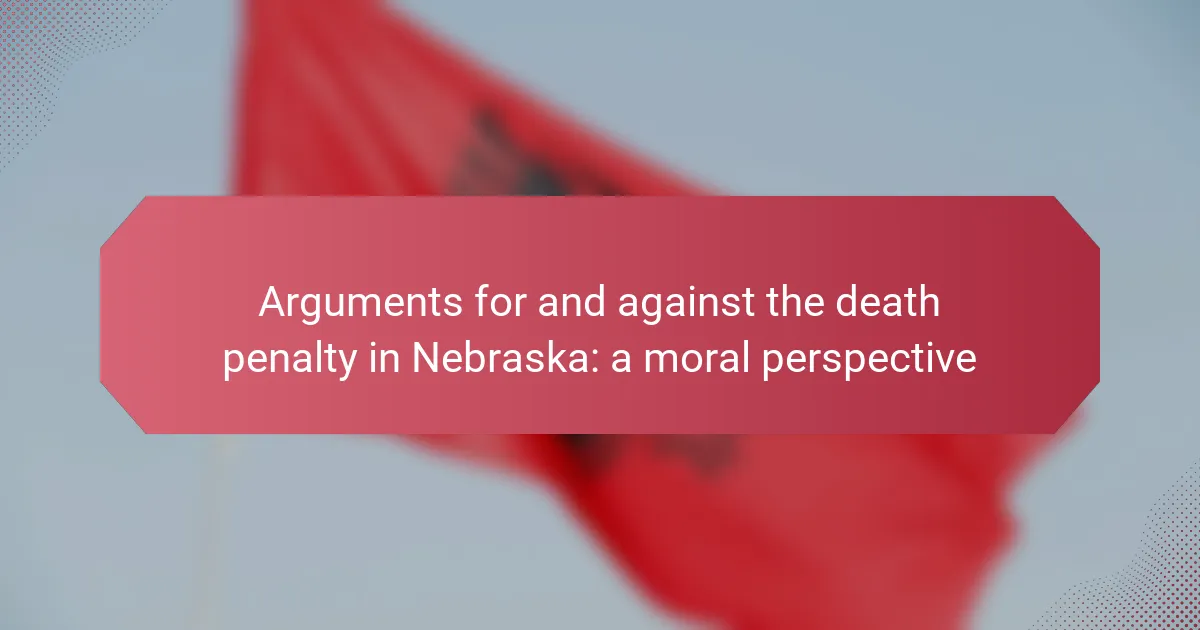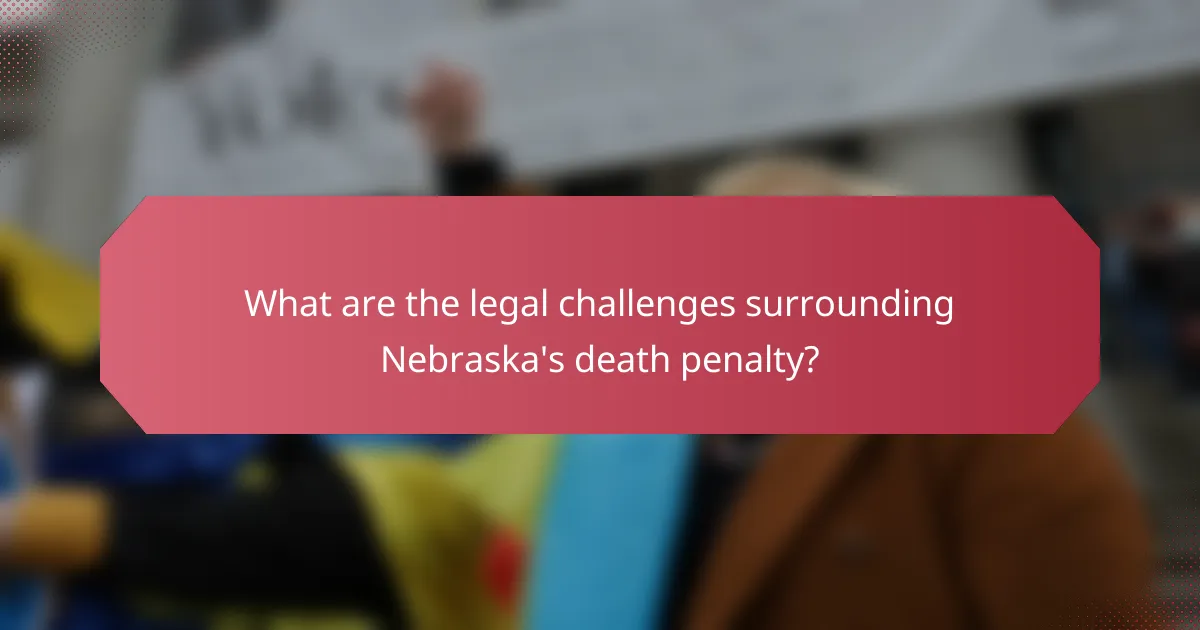
What are the legal challenges surrounding Nebraska’s death penalty?
Nebraska’s death penalty faces several legal challenges primarily related to its constitutionality and the methods of execution. One significant challenge is the argument that the lethal injection protocol violates the Eighth Amendment’s prohibition against cruel and unusual punishment. This concern arises from the use of drugs that may cause severe pain or suffering. Additionally, there have been disputes over the legality of the state’s drug supply for executions, as some drugs are obtained from manufacturers that prohibit their use in capital punishment.
Another legal challenge involves the state’s process for imposing the death penalty. Critics argue that racial bias influences sentencing and that inadequate legal representation can lead to wrongful convictions. These factors raise questions about the fairness of the death penalty system in Nebraska. Furthermore, legislative changes, such as the repeal of the death penalty in 2015 and its subsequent reinstatement, contribute to ongoing legal disputes regarding the state’s commitment to capital punishment.
In summary, Nebraska’s death penalty is challenged on constitutional grounds, execution methods, racial bias, and legal representation issues. These challenges highlight the complexities surrounding capital punishment in the state.
How have recent court rulings impacted Nebraska’s death penalty?
Recent court rulings have significantly affected Nebraska’s death penalty. In 2020, the Nebraska Supreme Court upheld the state’s lethal injection protocol. This ruling allowed executions to resume after a lengthy hiatus. Additionally, the court dismissed challenges related to the constitutionality of the death penalty itself. Critics argue that these decisions reinforce the death penalty’s viability in Nebraska. The rulings reflect ongoing legal debates about capital punishment in the state.
What specific cases have shaped the legal landscape of the death penalty in Nebraska?
The legal landscape of the death penalty in Nebraska has been shaped by several significant cases. One pivotal case is State v. Mata, decided in 2008. This case addressed the constitutionality of Nebraska’s lethal injection protocol. The court ruled that the protocol did not violate the Eighth Amendment’s prohibition against cruel and unusual punishment.
Another important case is State v. Moore, which occurred in 2010. In this case, the Nebraska Supreme Court examined the application of the death penalty in relation to mental competency. The ruling established that individuals deemed intellectually disabled could not be sentenced to death.
Additionally, the case of State v. Bruner in 2015 further influenced the legal framework. The court found that the death penalty could not be applied if the defendant was not directly responsible for the murder.
These cases collectively reflect the evolving standards of decency and legal interpretations surrounding capital punishment in Nebraska. They have led to significant changes in how the death penalty is applied and challenged its implementation in the state.
How do these rulings reflect broader national trends in capital punishment?
Recent rulings on capital punishment in Nebraska mirror national trends towards re-evaluating and limiting the use of the death penalty. These trends include a growing number of states abolishing capital punishment or imposing moratoriums. For instance, since 2000, 23 states have either abolished the death penalty or enacted moratoriums, reflecting a significant shift in public opinion. Furthermore, these rulings often emphasize concerns over wrongful convictions and racial disparities in sentencing. Nationally, there has been an increase in exonerations, with over 190 individuals released from death row, highlighting systemic flaws. Nebraska’s legal challenges contribute to this dialogue by questioning the efficacy and morality of capital punishment in modern justice systems.
What constitutional arguments are being made against the death penalty in Nebraska?
Arguments against the death penalty in Nebraska focus on constitutional issues such as cruel and unusual punishment. Opponents argue that the method of execution can cause unnecessary suffering. The Eighth Amendment prohibits such treatment. Additionally, there are claims regarding the arbitrary application of the death penalty. This raises concerns about equal protection under the law. Critics also argue that the death penalty disproportionately affects marginalized communities. This can violate the Fourteenth Amendment’s equal protection clause. These constitutional arguments are central to ongoing legal challenges in Nebraska.
What role does the Eighth Amendment play in these legal challenges?
The Eighth Amendment plays a critical role in legal challenges to Nebraska’s death penalty. It prohibits cruel and unusual punishment. This constitutional protection is often cited in arguments against the death penalty. Challengers claim that certain methods of execution violate this amendment. Courts evaluate these claims based on precedent and evolving standards of decency. For instance, lethal injection protocols have faced scrutiny under the Eighth Amendment. Legal precedents have established that excessively painful methods can be unconstitutional. Thus, the Eighth Amendment serves as a foundation for arguing against the death penalty’s legality in Nebraska.
How do claims of racial bias influence legal arguments against the death penalty?
Claims of racial bias significantly influence legal arguments against the death penalty. These claims highlight disparities in sentencing based on race. Studies show that defendants of color are more likely to receive death sentences than their white counterparts. For example, a 2017 report from the American Civil Liberties Union indicated that Black defendants were 3.5 times more likely to be sentenced to death. This evidence supports arguments that the death penalty is applied in a discriminatory manner. Legal advocates use this data to argue that racial bias violates the Equal Protection Clause. Consequently, claims of racial bias can lead to challenges in the constitutionality of death penalty statutes. These arguments aim to demonstrate that systemic bias undermines the fairness of legal proceedings.
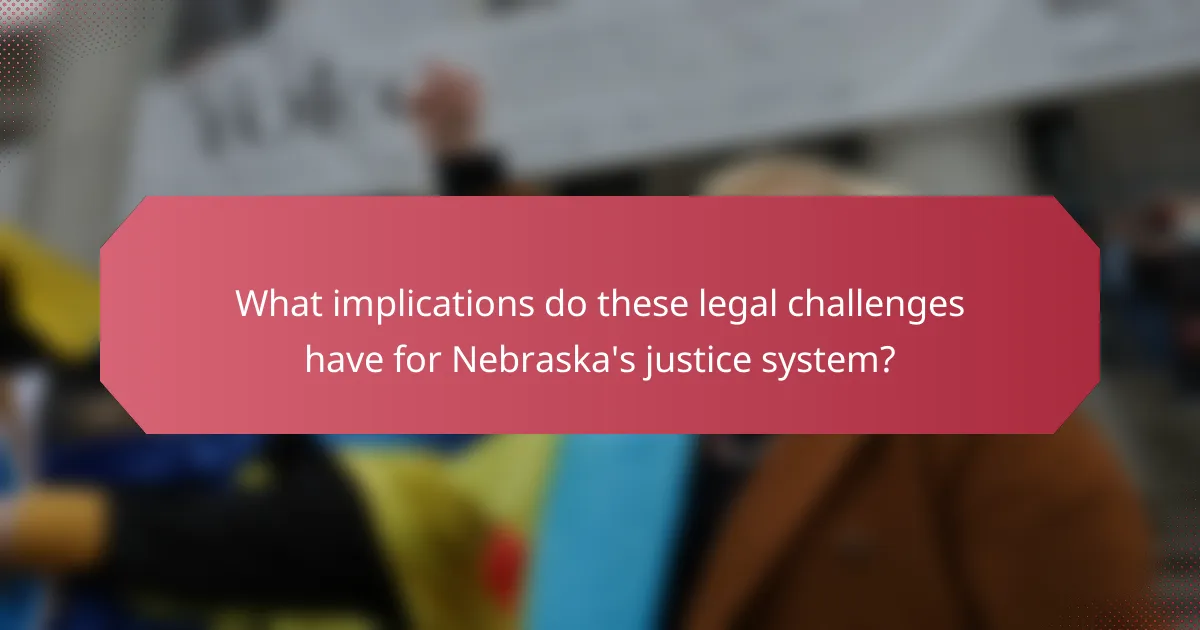
What implications do these legal challenges have for Nebraska’s justice system?
Legal challenges to Nebraska’s death penalty significantly impact the state’s justice system. These challenges can lead to prolonged litigation, affecting case resolution timelines. They may also prompt legislative changes regarding capital punishment laws. Additionally, public opinion can shift, influencing policymakers and judicial decisions. The challenges could result in increased scrutiny of the death penalty’s application and fairness. Furthermore, they may raise questions about the adequacy of legal representation for defendants in capital cases. Overall, these implications can reshape the landscape of justice in Nebraska.
How might changes to the death penalty affect public opinion in Nebraska?
Changes to the death penalty could significantly influence public opinion in Nebraska. Recent surveys indicate that Nebraskans are divided on the issue. A 2020 poll showed that 60% of residents support the death penalty in some form. However, changes such as moratoriums or abolishment could lead to increased support for alternatives like life imprisonment. Advocacy groups argue that shifting to life sentences could resonate positively with a more humane approach to justice. Historical trends show that states with active debates on the death penalty often see fluctuations in public sentiment. In states where the death penalty was abolished, such as Illinois, public opinion shifted towards more favorable views of life sentences. Thus, any legal changes may provoke renewed discussions and potentially reshape attitudes among the Nebraska populace.
What are the potential consequences for victims’ families in light of these challenges?
Victims’ families may experience emotional distress and prolonged grief due to legal challenges surrounding Nebraska’s death penalty. These challenges can delay justice and closure for the families. Extended legal proceedings can lead to frustration and feelings of helplessness. Families may also face financial burdens from ongoing legal fees. Additionally, public debates and media coverage can exacerbate their trauma. The uncertainty of outcomes can create anxiety about the future. Overall, these challenges can significantly impact victims’ families’ mental and emotional well-being.
How could these legal challenges influence future legislation regarding capital punishment?
Legal challenges to capital punishment can significantly influence future legislation. These challenges often highlight constitutional issues, such as due process and cruel and unusual punishment. Courts may rule against certain methods of execution or the application of the death penalty itself. Such rulings can prompt lawmakers to reconsider existing laws and practices. For example, if a court finds a method of execution unconstitutional, states may be forced to revise their execution protocols. Additionally, public sentiment may shift in response to these legal challenges. Increased awareness of wrongful convictions can lead to calls for abolition or moratoriums on the death penalty. Historical examples show that legal challenges have previously led to legislative reforms in various states. Overall, ongoing legal battles can create a ripple effect, prompting legislative bodies to reassess capital punishment policies.
What are the economic implications of maintaining or abolishing the death penalty in Nebraska?
Maintaining the death penalty in Nebraska incurs significant economic costs. These costs stem from lengthy legal processes, including trials, appeals, and incarceration. A study by the Nebraska Coalition to Abolish the Death Penalty indicated that death penalty cases can cost up to four times more than life imprisonment cases. The average cost of a death penalty case in Nebraska exceeds $1 million, while life sentences without parole are considerably less expensive. Abolishing the death penalty could lead to substantial savings in legal and correctional expenditures. States that have abolished the death penalty often report reduced costs associated with the criminal justice system. Thus, the economic implications of maintaining the death penalty include high financial burdens, while its abolition could offer significant fiscal relief.
How do the costs of capital cases compare to non-capital cases?
Capital cases are significantly more expensive than non-capital cases. The costs associated with capital cases include extensive legal fees, expert witness expenses, and prolonged trial durations. A study by the Nebraska Legislative Fiscal Office indicated that capital trials can cost up to four times more than non-capital trials. Additionally, the appeals process for capital cases is lengthier and more complex, further increasing costs. In contrast, non-capital cases typically involve shorter trial processes and fewer legal complexities. This financial disparity highlights the substantial economic burden of capital punishment on the judicial system.
What financial resources are required for legal defense in death penalty cases?
Legal defense in death penalty cases requires substantial financial resources. Costs can include attorney fees, expert witness fees, and investigative expenses. Defense attorneys typically charge higher rates for capital cases due to their complexity. Expert witnesses, such as forensic specialists or psychologists, may charge thousands of dollars for their services. Investigative costs can also be significant, as thorough investigations are crucial in death penalty cases. Additionally, expenses for trial preparation, including jury selection and trial materials, can accumulate rapidly. Overall, the total financial burden for a death penalty defense can range from hundreds of thousands to millions of dollars, depending on the case’s specifics.
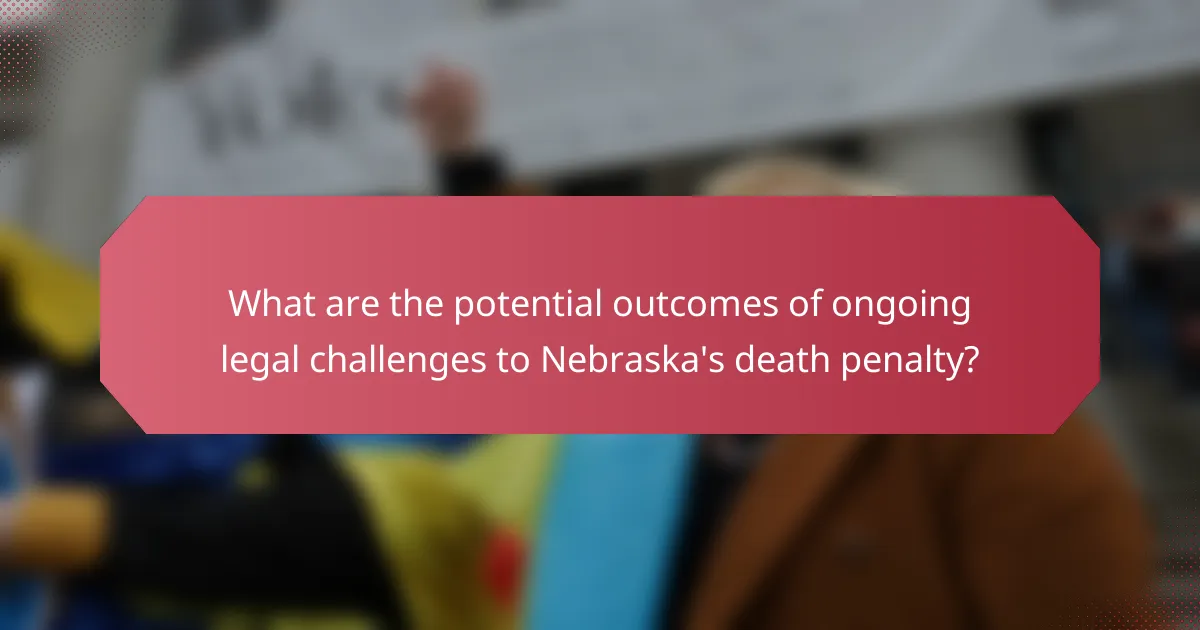
What are the potential outcomes of ongoing legal challenges to Nebraska’s death penalty?
Ongoing legal challenges to Nebraska’s death penalty could lead to significant changes in its application. One potential outcome is the abolition of the death penalty altogether. This could occur if courts find the current system unconstitutional. Another possibility is a moratorium on executions while legal issues are resolved. Additionally, challenges may result in changes to the methods of execution or the criteria for imposing the death penalty. Legal precedents set by these challenges could impact future cases. The ongoing litigation may also influence public opinion and legislative action regarding capital punishment in Nebraska. Each of these outcomes reflects the evolving legal landscape surrounding the death penalty.
How might the Nebraska Supreme Court’s decisions shape the future of capital punishment?
The Nebraska Supreme Court’s decisions could significantly influence the state’s capital punishment landscape. Recent rulings have the potential to redefine legal standards surrounding the death penalty. Changes in judicial interpretation could lead to stricter regulations on execution methods. Additionally, decisions may impact the appeals process for death row inmates. Historical context shows that similar rulings in other states have led to moratoriums on executions. For instance, the court’s stance on constitutional challenges can either uphold or dismantle existing death penalty statutes. Overall, the Nebraska Supreme Court’s future decisions will likely shape both public perception and legislative actions regarding capital punishment.
What are the possible scenarios for the future of the death penalty in Nebraska?
The future of the death penalty in Nebraska may involve several scenarios. One scenario is the potential for legislative repeal. Recent trends show growing public support for abolishing capital punishment. In 2015, Nebraska’s legislature passed a bill to abolish the death penalty, although it was later overturned by referendum.
Another possibility is continued legal challenges. Courts may rule on the constitutionality of execution methods or the application of the death penalty itself. In 2020, the Nebraska Supreme Court upheld the death penalty, but ongoing litigation could change its status.
A third scenario involves changes in administration. New governors may have differing views on capital punishment, influencing its future. The current governor supports the death penalty, but future leadership could pivot towards abolition.
Additionally, public opinion may shift. Increased awareness of wrongful convictions and racial disparities could lead to greater opposition. If public sentiment continues to trend against the death penalty, this could prompt further legislative action.
Overall, the future of the death penalty in Nebraska remains uncertain, influenced by legal, political, and social factors.
What best practices can be adopted in light of legal challenges to the death penalty?
Adopting best practices in light of legal challenges to the death penalty involves several key strategies. First, states should conduct comprehensive reviews of their death penalty statutes. This ensures compliance with constitutional standards and addresses any legal inconsistencies. Second, implementing rigorous training for legal professionals on death penalty cases can improve the quality of representation. Third, states should prioritize transparency in the execution process. This includes clear documentation of protocols and the drugs used in lethal injections. Additionally, establishing independent oversight committees can help monitor death penalty cases. Such committees can evaluate fairness and address public concerns. Finally, engaging in open dialogue with stakeholders, including advocacy groups, can foster a more informed public discussion about the death penalty. These practices are essential to navigate the evolving legal landscape surrounding capital punishment.
How can stakeholders engage in constructive dialogue about capital punishment reforms?
Stakeholders can engage in constructive dialogue about capital punishment reforms through structured forums and discussions. These platforms should include diverse participants, such as legal experts, advocacy groups, and affected families. Facilitated discussions can help ensure all voices are heard. Active listening is essential to understand differing perspectives. Empirical data on the effectiveness and morality of capital punishment should guide conversations. Research indicates that states with moratoriums on the death penalty have lower rates of wrongful convictions. Sharing personal stories can humanize the debate and foster empathy. Collaborative efforts may lead to consensus on potential reforms, such as abolishing the death penalty or implementing stricter oversight.
The primary entity of this article is Nebraska’s death penalty, which is currently facing various legal challenges related to its constitutionality, methods of execution, and issues of racial bias and legal representation. Key discussions include the implications of recent court rulings, significant legal cases that have shaped the death penalty landscape, and the broader national trends influencing capital punishment. The article also explores the economic implications of maintaining or abolishing the death penalty, potential outcomes of ongoing legal challenges, and best practices for reforming capital punishment in light of these challenges. Overall, it highlights the complexities and evolving nature of the death penalty system in Nebraska.
